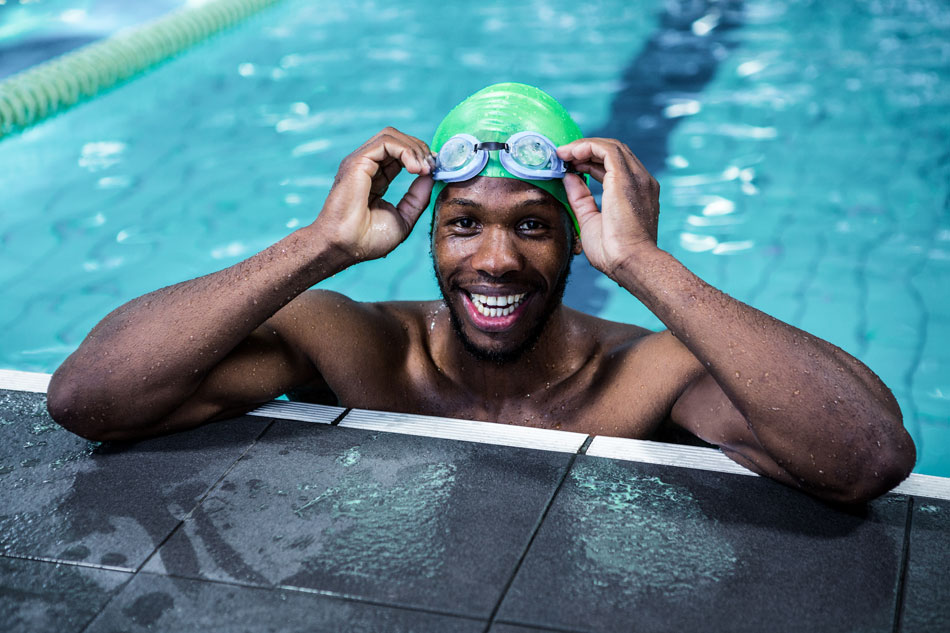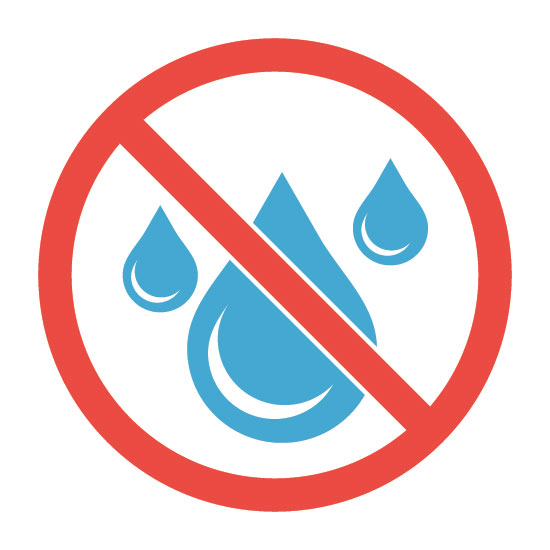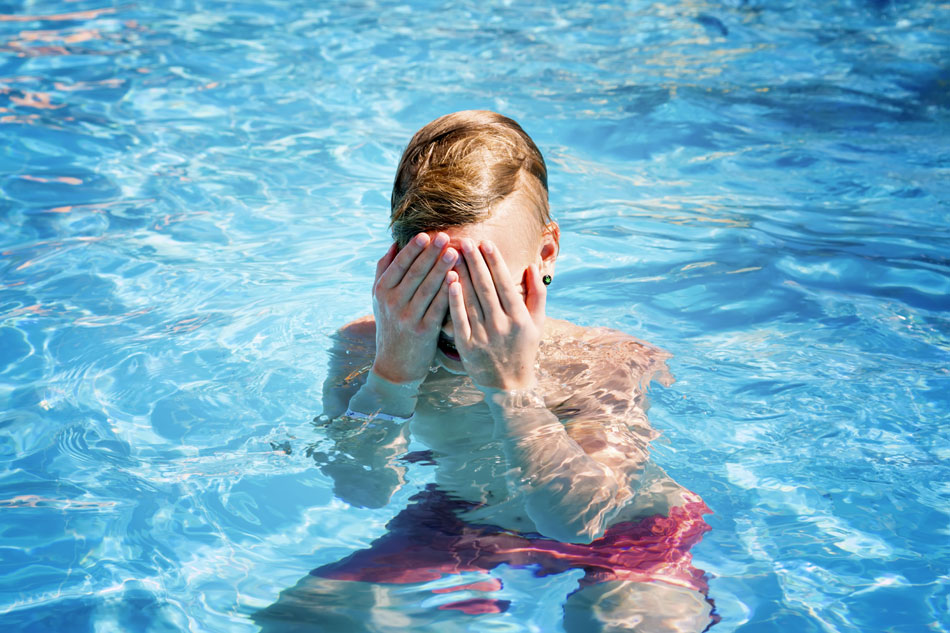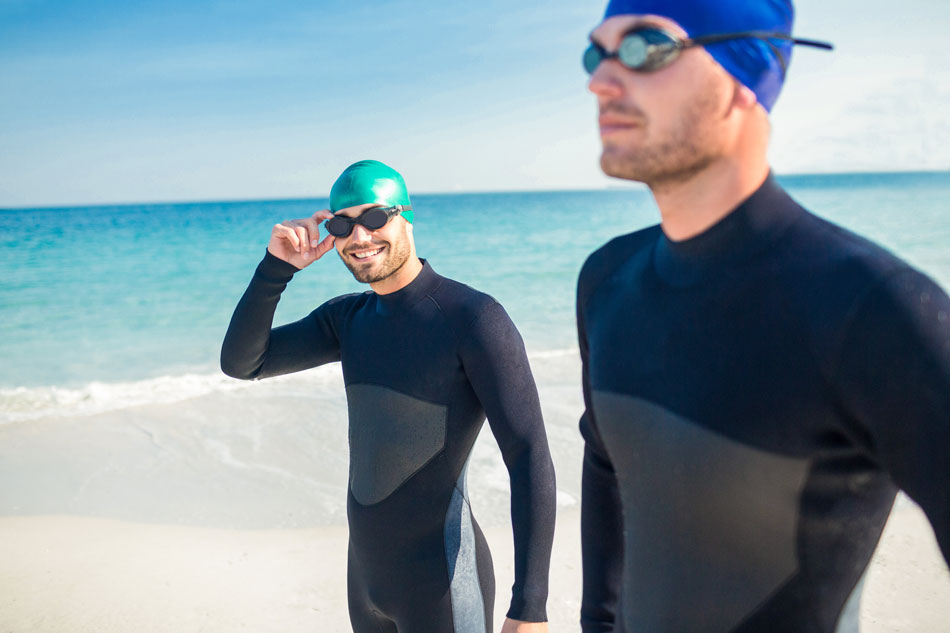Safeguard Your Eyes: How Dangerous Is Swimming With Contacts?

Most contact lens wearers engage in risky behaviour from time to time. Exhausted after a long day? You might fall asleep on the couch with your lenses in. You might squeeze a few extra days out of your contacts. Or give your lens case a quick rinse when you know it needs a good scrub. How about swimming with contacts in when you know you shouldn’t?
Risky behaviours like these are responsible for a lot of contact lens-related eye infections. An eye infection may start with a gritty feeling and touch of redness. But these infections can develop into serious conditions and even vision loss. Among lens wearers, the most frequent risky behaviours include late contact replacement, sleeping in contacts and swimming with contacts on.
Swimming with contacts is an easy contact lens hygiene issue to rectify. Just take them out! Yet people continue to put their sight at risk. They assume that leaving their contacts in to swim is no big deal. But that’s not true! Join us as we look at exactly how dangerous it is to swim with contacts.
Why Contact Lenses and Water Are Not a Good Combo!

Contacts react to water by getting swollen and distorted. They stick to your eyeballs and just generally misbehave.
The two main types of contacts are rigid gas permeable (RGP) lenses and soft contact lenses. RGP lenses can be easily knocked out from your eyes when you’re in the water. On the other hand, soft contacts are quite porous and can absorb anything lurking in the water. It’s easy for bacteria and other nasty things to settle and flourish in your eyes when you go swimming with your contacts on.
Your cornea, the transparent film that covers the front of your eye, is very delicate. Even the lightest corneal scratch makes it easier for germs to enter the eye and cause an infection. In fact, any irritation to the cornea can cause scratches. If these scratches are deep enough, this can lead to scarring which, in turn, affects your vision.
Avoid All Types of Water
You may think chlorinated swimming pool water and salty seawater are clean and germ-free. But that’s not true at all! All types of water can irritate your eyes, whether it’s from a swimming pool, seawater or fresh water. Contact with chlorinated, salt and fresh water rinses away the eyes’ natural lubrication. Even those who don’t wear contact lenses may find their eyes are dry and red after swimming.
All water is home to nasty bacteria, viruses and other microorganisms. The worst waterborne nasties are the bacteria Pseudomonas aeruginosa and the amoeba Acanthamoeba. Both of these rare pathogens can cause serious and painful infections. These infections can lead to blindness if left untreated. They often require sight-saving corneal transplants.
What to Do if Lenses Get Wet

Health Canada recommends that you protect your lenses from exposure to any kind of water. This includes tap water, water in swimming pools, oceans, lakes, rivers, hot tubs and even showers.
Always use contact lens solution to clean your contacts and to disinfect and fill your storage case. Plus, make sure your hands are completely clean and dry before touching your eyes. Even in an emergency, such as removing your lens due to irritation, do not use water! Remove both lenses and wait until you can safely disinfect and reinsert them.
If your contact lenses get wet, take them out immediately. If you have reusable lenses, optometrists advise that you disinfect them overnight. But to be on the safe side, you can purchase new lenses. Consider using daily disposable lenses that you can discard as needed. You’ll also have a fresh sterilized pair to use while you’re on the go!
Wearing My Contacts in Water
Daily Disposable Lenses
If you swim on a regular basis, your best course of action is to swim in the afternoon and wear glasses afterwards. That way, you don't have to use two sets of disposables, like Focus Dailies, per day.
If you aren't able to swim without vision correction, then you can leave your lenses in. But you must wear good waterproof swimming goggles. This method of wearing your lenses works best with daily disposables. You’ll be able to immediately swap those lenses for a fresh pair after your swim. Good swimming goggles not only protect your eyes from nasty pathogens in the water, but they also keep your lenses from being dislodged.
Prescription Goggles

A less risky option for those who cannot swim without vision correction is prescription goggles. They are efficient at correcting refractive errors like myopia (nearsightedness) and hyperopia (farsightedness).
But if you have astigmatism or presbyopia, you’ll likely need highly customized prescription goggles. This can be quite pricey and not worth it if you don’t go swimming that often. Look into getting daily disposables to pair with regular waterproof goggles instead.
This option is also great for kids and can save you money in the long-run. If you often swim outdoors, you can get goggles with a UV filter to protect your eyes from the sun’s rays. Prescription goggles are great, as they give you pristine visual acuity underwater. Plus, you’re able to swim without exposing your contacts to the water.
Laser Eye Surgery

Another option to consider is laser eye surgery. Laser eye surgery is the best way to eliminate the need to wear glasses or lenses ever again. You can then lead a very active lifestyle and have the freedom to swim whenever you choose.
This surgery can correct myopia, hyperopia and astigmatism and has a high success rate. But laser eye surgery can be an expensive option and comes with risks best discussed with your optometrist.
Avoid Swimming With Contacts!
With all these great options, swimming with contacts is not only dangerous, but unnecessary. Explore the choices available to you and protect your eyes. Promise yourself to never swim with contacts again. Take good care of your vision by taking out those lenses before making your big splash!
